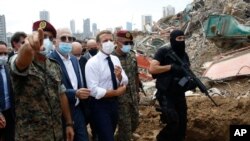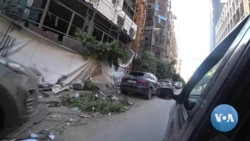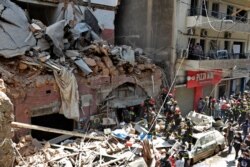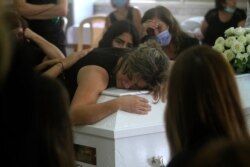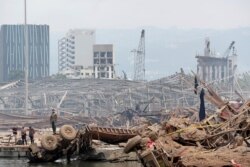French President Emmanuel Macron said Thursday that he would organize an international conference to raise funds for Lebanon, but he warned Lebanese leaders that they would not be getting “blank checks.”
Macron was the first foreign leader to visit Lebanon after Tuesday’s massive blast at the port of Beirut that left large parts of the city in a shambles of wrecked buildings, burned-out cars and dust.
Macron said Thursday that any money to help Beirut recover must come with what he called a “new political order” to replace a “system that no longer has the trust of its people.”
“If reforms are not carried out, Lebanon will continue to sink,” he said during a news conference. “What is also needed here is political change. This explosion should be the start of a new era.”
Macron said financial help for Beirut should go directly to aid groups and those who need it.
The French president toured the wrecked port and some of the devastated neighborhoods, promising residents that the money would be given out with transparency and “not go into the hands of corruption.”
Some bystanders shouted “Revolution!” and “Down with the regime!” as Macron walked through the debris-covered streets.
There have been a lot of previous promises from the international community to help Lebanon, but little money has actually reached the country. Donors cite corruption and the various factions inside the country, including Iranian-backed Hezbollah terrorists massed along the southern border with Israel.
Authorities believe tons of ammonium nitrite stored in warehouses for six years exploded Tuesday, killing 137, wounding more than 5,000 and leaving 300,000 homeless.
Officials said they expected the death toll to rise as the wreckage was searched. Initial damage estimates were as high as $15 billion.
Health officials also feared the disaster would aggravate the coronavirus outbreak after victims packed hospitals and the homeless sought shelter.
Lebanon’s Cabinet declared a two-week state of emergency and ordered the military to place under house arrest anyone involved in warehousing the explosive material that detonated at the port.
President Michel Aoun pledged that those accountable would face “the most severe penalties.”
A Lebanese official who was a target in the probe tried to shift blame for the storage of the explosive material at the port. Badri Daher, head of the Customs Department, told LBC television late Wednesday that officials had sent as many as six letters to the judiciary over the years, asking that the ammonium nitrate be removed because of the danger it presented.
Daher said he could do nothing more than alert authorities, even if it meant “extra work” for him and his predecessor. Daher also maintained the port authority was responsible for the explosive material, while his responsibility was to prevent smuggling and collect duties.
Human Rights Watch, meanwhile, called for an independent investigation of the explosion. The group said international experts should be allowed into Lebanon to “determine the causes and responsibility for the explosion and recommend measures to ensure it cannot happen again.”
Russia flew in a mobile military hospital along with 50 medical workers. Qatar is also sending a field hospital, while Iraq is supplying a crew of medical workers and truckloads of supplies.
Tunisia offered to take patients there for treatment, and Germany dispatched a team of rescue experts and search dogs.
Cash pledges came in from Australia, Britain and Hungary.
The commander of the U.S. Central Command, General Kenneth "Frank" McKenzie, said the Pentagon was delivering food, water and medical supplies to the Lebanese armed forces to help meet the critical needs of the Lebanese people.”
Secretary of State Mike Pompeo said the Trump administration would announce details of additional help for Lebanon in coming days.
VOA's Nike Ching at the State Department and Patsy Widakuswara at the White House contributed to this report.




